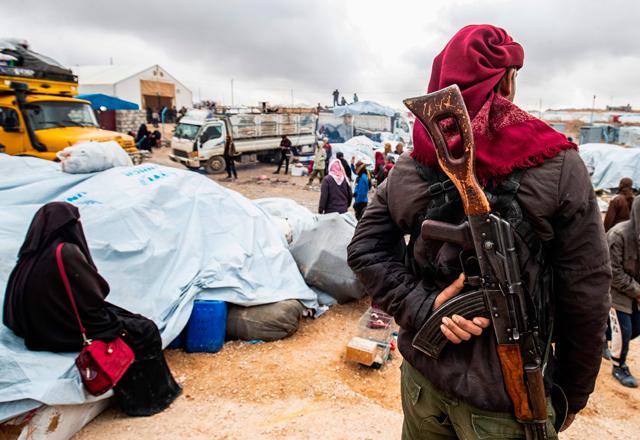- International News
- Tue-2020-11-17 | 02:39 pm

More than 500 Syrians, some related to alleged DAESH group members, quit the overcrowded Kurdish-run camp of Al Hol in the northeast of the war-torn country Monday, Kurdish officials said.
An AFP reporter saw dozens of women lugging their belongings onto trucks, and others feeding their children before their departure.
Some were accompanied by chickens and sheep, while Kurdish security forces inspected their bags as they filed out of the camp in Hassakeh province.
Among them, 31-year-old Fatima was delighted to be finally going home to the eastern province of Deir Ezzor, after living in a tent with her seven children.
"We’re so happy to be going back to our houses,” she said.
"I’m going back to Sousa [village], to live in my house with my husband who was living abroad,” she added, without providing more details.
"Our home areas now are stable and safe, and most families in the camp want to return,” she said.
Sheikhmous Ahmad, a Kurdish official in charge of the region’s camps, said 515 people from 120 families were returning to areas in the east of Deir Ezzor province.
The Syrian Democratic Council, the political wing of the region’s main military force, also said they had left in a statement.
They were the first to do so after the Kurdish authorities in northeast Syria last month vowed to allow thousands of Syrians, including the families of Daesh fighters, out of the over-populated camp.
‘Big burden’
Al Hol hosts more than 60,000 people, including 24,300 Syrians either captured or displaced by fighting to expel Daesh from their last scrap of Syrian territory almost two years ago, according to the UN Office for the Coordination of Humanitarian Affairs.
Iraqis make up the bulk of tens of thousands of foreigners in Al Hol, which also holds alleged Daesh relatives from around 50 countries, including Western nations.
Before the latest announcement, around 6,000 Syrians had left the camp in several waves, after the Arab tribes in their home regions had vouched for them.
Under the new system, another 10,000 Syrians were expected to go home after signing up to do so, said Ahmad.
Iraqis are not included in the departures, and Kurdish officials have criticised Iraq’s lack of action towards repatriating its nationals.
The Kurds say the camp has become a "big burden”, especially after guards were stabbed and amid escape attempts.
In August, the first resident tested positive for the novel coronavirus in the camp, whose density has been described as three times that of New York city.
In October, the Kurdish-led Syrian Democratic Forces (SDF) released 600 prisoners detained over their alleged ties to Daesh in the first such general amnesty.
Daesh fighters overran large parts of Syria and neighbouring Iraq in 2014, declaring a cross-border "caliphate” and implementing its brutal rule on millions.
Several campaigns whittled away at that proto-state, until the US-backed SDF last year expelled the fighters from their last patch of land in the Deir Ezzor hamlet of Baghouz, south of Sousa.
Western nations have been largely reluctant to repatriate their Daesh-linked nationals held in northeast Syria, though some have brought home women and children on a case-by-case basis.













